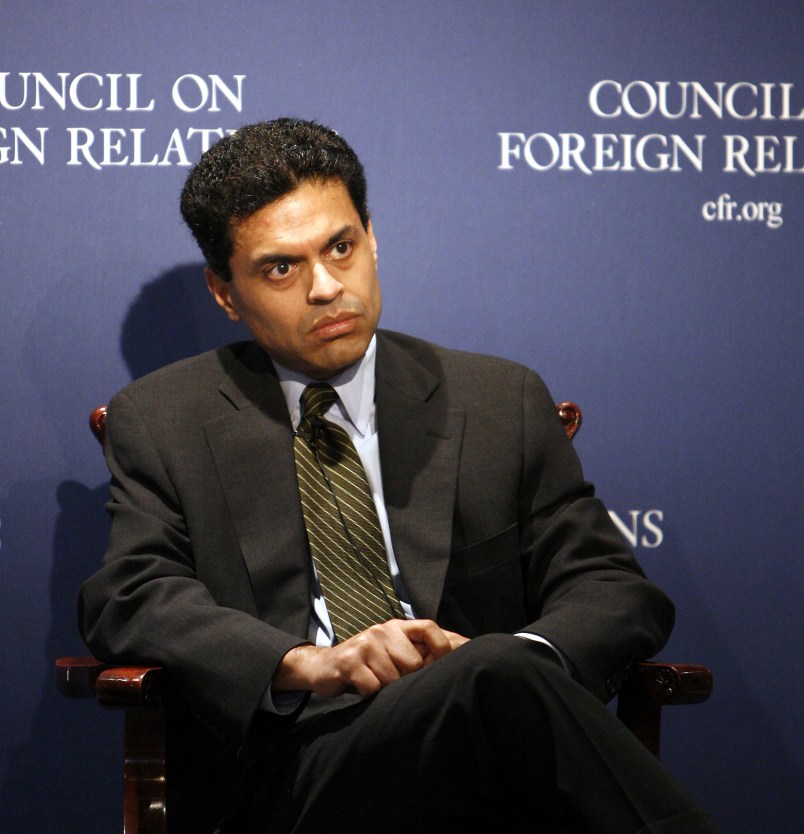The pair of anonymous Twitter users who last month exposed a BuzzFeed editor’s plagiarism came out with new accusations Tuesday against journalist Fareed Zakaria.
On their blog Our Bad Media, the Twitter duo who use the handles @blippoblappo and @crushingbort assembled twelve passages of what they said appeared to be plagiarism by the Peabody-award winning journalist.
The accusations reopen an incident from 2012 in which Zakaria apologized for plagiarizing New Yorker’s Jill Lepore. The incident got him suspended from his job as editor-at-large at Time magazine as well as suspended from his hosting gig at CNN. He also volunteered to temporarily halt his column for the Washington Post for one month.
Following the incident, CNN and Time released statements saying they had conducted internal reviews of Zakaria’s other work and had found no other instances of plagiarism. At the Washington Post, editorial page editor Fred Hiatt said, “We’ve never had any reason to doubt the integrity of his work for us. Given his acknowledgment today, we intend to review his work with him.”
But the duo at Our Bad Media said on Tuesday that any internal reviews conducted by the outlets appeared to fail to catch several more instances of Zakaria lifting work from sources with attribution.
For example, here’s a Wikipedia article on “Reganonomics” dated August 3, 2011:

Here is Zakaria’s column “The Debt Deal’s Failure,” from Time in August 15, 2011:

From an article in The Nation by Vadim Nikitin from July 18, 2011:

And here, Zakaria’s column, “The People Vs. Putin,” from Time in December of that year:

As @blippoblappo and @crushingbort noted, Time called the plagiarism of Lepore in 2012 “an isolated incident” and CNN called it “a journalistic lapse.” After Zakaria took a month of from his column at the Washington Post, a spokesperson for the paper told TPM, “[t]here has been nothing problematic in his Post columns.”
Reached for comment Tuesday, Time’s vice president of communications Daniel Kile told TPM:
“While Fareed Zakaria is no longer employed by Time Inc., TIME takes these charges very seriously. In 2012, we conducted a review of Zakaria’s work for TIME and were satisfied with the results of that investigation. We will be reviewing these new allegations carefully.”
(Time’s website earlier on Tuesday said Zakaria was still a regular columnist in the magazine and a contributor to the website. His most recent article appears to have been published in April. On Tuesday afternoon, a Time spokesman told TPM the bio had been updated to reflect that Zakaria no longer works there.)
Washington Post’s director of communications Kristine Coratti Kelly told TPM in an email, “it is the first I am hearing of it. Let me look into it and I will get back to you.”
Zakaria could not be reached for comment.
In their blog post, the Twitter sleuths wrote that the reported instances of plagiarism cast doubt upon the conclusions of the outlets’ internal reviews of Zakaria’s work.
“It took less than an hour and a few Google searches for us at Our Bad Media to find an example of lifting in Zakaria’s columns written before the 2012 plagiarism scandal,” they wrote.
“So we’re left to wonder: did TIME, CNN, or the Washington Post actually conduct good faith reviews of Zakaria’s work?” the duo wrote. “Have they since?”
During the 2012 incident, Craig Silverman at Poynter raised questions about the transparency of the reviews. “It’s possible all three outlets are looking into Zakaria’s previous work,” he wrote, “but it’s not clear how or what they’re doing, whether the results will be communicated, or when.”
This post has been updated.







Not just a plagiarist but a Wiki plagiarist - the lowest grade of plagiarist.
Still, nice to see a break from all the non-stop Ferguson coverage. Back to our roots!
You can’t plagiarize the news. You really can’t plagiarize statistics, either. A new theory, an fresh anaysis drawing new conclusions, text written in a fresh and unique way, these things can be plagiarized. How many news outlets right now are ‘plagiarizing’ one another by using the same facts about Ferguson, Missouri?
They owe us a goodie like this.
Never thought much of him to begin with, he came off as a fraud. He is a typical Republican masquerading as member of the intelligentsia. Looks as if I was right.